If you're thinking about bringing pepper spray on a plane, you need to know that the TSA doesn't allow it in carry-on bags. Some airlines might let you pack it in checked luggage, but it really depends on their specific rules. Also, different countries have different laws—some, like Canada, allow it with rules, while others, like the UK and Japan, completely ban it. Make sure to check the TSA website and your airline's policies before you pack. Being informed is super important for your safety and to avoid any issues. There's definitely more you should know!
Understanding Pepper Spray Regulations
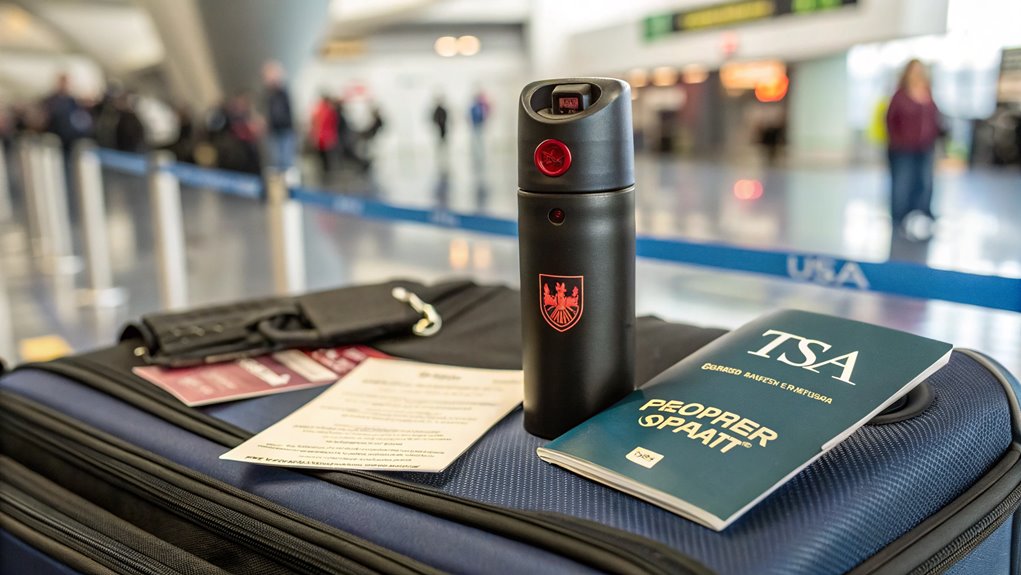
Although you might think pepper spray could be a useful self-defense tool, it's vital to understand the regulations surrounding its use on planes. Many people believe they can carry pepper spray with them for personal safety, but that's not always the case.
Each airline and country has its own self-defense laws, and some explicitly ban pepper spray altogether. Before you even think about packing that canister, consider what could happen if you try to take it on a flight. It's important to note that certain product variants of pepper spray have customization options that may affect their usability and legality in different regions.
If you accidentally bring it aboard, you could face serious consequences, including fines or even arrest. It's important to know that even if you think you're prepared to defend yourself, the laws governing pepper spray can vary widely.
Instead of risking trouble, check with your airline and research the local laws about self-defense tools like pepper spray before you travel. The WildFire 1.4% Crowd Control 9oz Fire Master Fogger Pepper Spray, for instance, is a potent formula often trusted by law enforcement, but its usage may be restricted on flights.
TSA Guidelines for Carry-On Items
When it comes to traveling with carry-on items, understanding TSA guidelines is vital for a smooth journey. You don't want to end up at the airport, just to find out you can't take something important on board.
The TSA has specific restrictions, and it's important to know what's allowed and what isn't. For example, certain items like knives and flammable liquids are on the list of prohibited items.
If you're thinking about bringing pepper spray, you should know that the TSA generally considers it a prohibited item. While it might feel like a good self-defense tool, it can cause serious issues at security checkpoints. Instead of risking a confiscation, it's best to leave it at home.
For instance, products like the WildFire 1.4% Crowd Control Pepper Spray are designed for professional use and might not be suitable for air travel due to their potent formulation and size.
Always check the TSA website before your flight, as rules can change. Remember, knowing the guidelines not only helps you avoid stress but also guarantees your safety and the safety of other passengers.
Staying informed about TSA restrictions is key to a hassle-free travel experience. So, take a moment to double-check what you can and can't bring; it's worth it!
Airline-Specific Policies
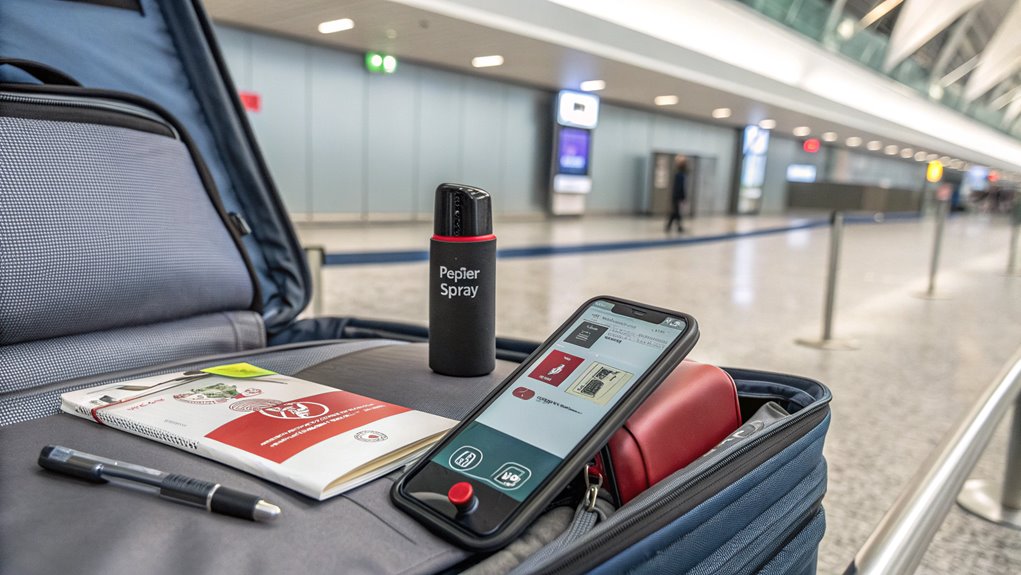
Airlines have their own policies regarding pepper spray, and understanding these rules is essential for your travel plans.
While the TSA may allow certain items in your carry-on, airlines often have stricter guidelines. So, before you pack your bag, check the specific airline's website. Some may completely ban pepper spray as a prohibited item, while others might allow it under specific conditions, like size or container type.
For instance, certain airlines might permit small canisters, but only in checked luggage. Others might require you to declare it at check-in.
If you're not careful, you could find yourself at the airport with an item you can't take on board. This can lead to delays or, worse, having to toss it in the trash.
International Travel Considerations
Traveling internationally with pepper spray requires careful consideration of various regulations across different countries. While you might feel safer having it on your trip, international customs can have strict rules about pepper spray legality. Before you pack your bags, check the laws of your destination country. Some places might ban it entirely, while others may have restrictions on size or strength.
Here's a quick reference table to help you understand the regulations:
| Country | Pepper Spray Legality |
|---|---|
| Canada | Legal, with restrictions |
| United Kingdom | Illegal |
| Australia | Legal, but size limits apply |
| Japan | Illegal |
Always do your homework! Not knowing the laws can lead to serious trouble, including fines or even arrest. If you find that pepper spray isn't allowed where you're headed, consider alternatives for self-defense. Staying informed and prepared guarantees you can travel safely and avoid unexpected issues. Remember, your safety is important, so it's worth the effort to know what's allowed before you go!
State and Local Laws
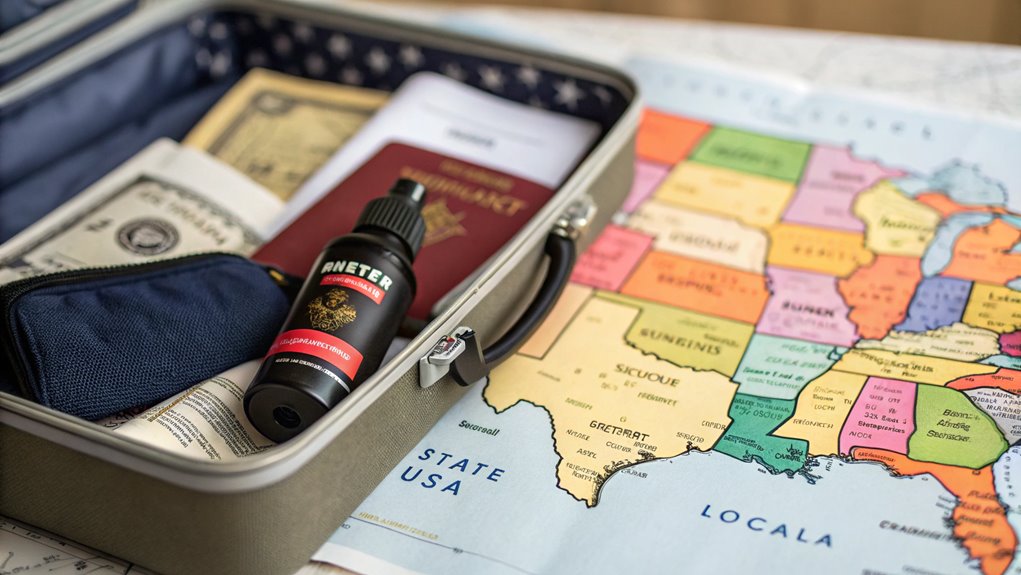
Understanding state and local laws about pepper spray can help you navigate your self-defense options effectively. Each state has its own rules, so you need to do your homework. Some states have strict restrictions on how much pepper spray you can carry, while others have no limits at all.
Plus, legal definitions of what constitutes pepper spray can vary, which might affect your ability to use it for self-defense. For example, in some places, pepper spray is classified as a weapon, while in others, it's seen as a self-defense tool.
You'll want to check your local laws because carrying pepper spray in a state where it's illegal can lead to serious trouble. If you're traveling, make sure to look up the rules for each state you'll pass through, not just your own.
Also, don't forget that local ordinances can impose additional restrictions. It's important to know if there are specific rules in your city or county that could impact your ability to carry pepper spray.
Always stay informed, so you can protect yourself legally and effectively!
Exceptions to the Rules
While knowing state and local laws is important, there are exceptions that can complicate your understanding of pepper spray regulations. For example, if you're flying to a different state, the rules may change once you land. Some states have legal exceptions that allow for certain types of pepper spray, while others may have stricter limits.
It's essential to do your homework before you travel, as ignorance could lead to serious consequences, especially with safety concerns in mind.
Airlines might also have their own rules about what you can and can't bring on board, so checking with them is a must. Even if your state allows the use of pepper spray, the airline mightn't permit it in your carry-on or checked bags. This can be confusing, and it's easy to overlook these details.
Remember that the goal is your safety and that of those around you. Understanding these exceptions can help you avoid unnecessary trouble.
Always double-check the latest regulations before your trip. It's better to be safe than sorry, so make sure you're clear on what's allowed and what isn't when it comes to self-defense tools like pepper spray.
Alternatives to Pepper Spray
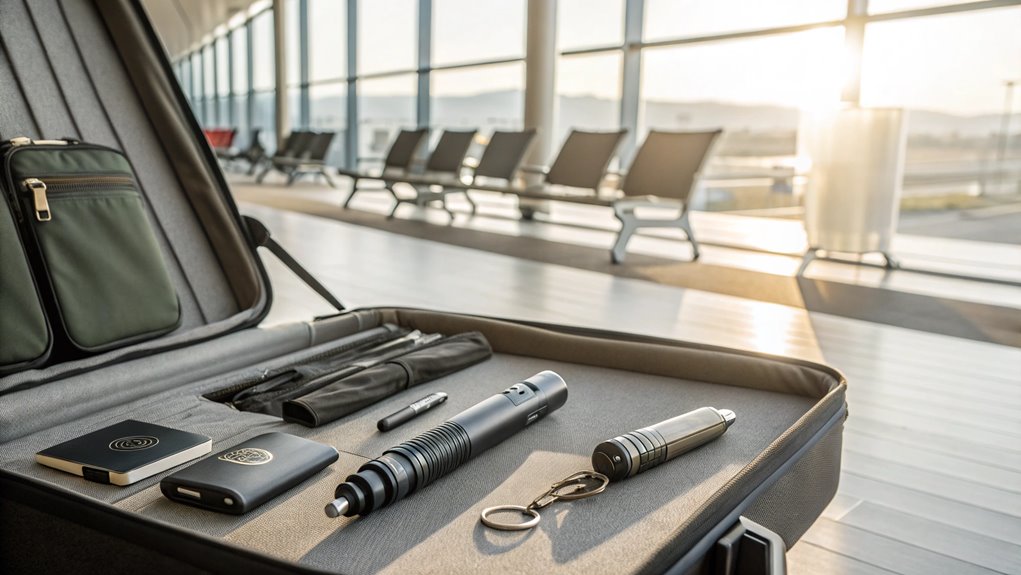
What should you consider if pepper spray isn't an option for self-defense? When it comes to personal safety, you've got plenty of alternatives to explore.
For starters, think about self-defense tools like personal alarms. These gadgets make a loud noise to scare off attackers and draw attention to your situation. They're lightweight and easy to carry, making them a great choice.
Another option is a tactical pen. It looks like an ordinary pen, but it can be used for self-defense in a pinch.
If you need something more hands-on, consider self-defense keychains. They're small, easy to use, and can be really effective if you find yourself in a tough spot.
Don't forget about self-defense courses! Learning basic moves can boost your confidence and help you handle a situation if it arises.
Finally, always trust your instincts. If something feels off, don't hesitate to leave the area or seek help from someone nearby.
Reporting Issues at Security
If you encounter a situation at airport security that raises concerns, it's important to know how to report it effectively. First, stay calm and assess the situation.
If you see something suspicious or feel uncomfortable, you should approach a security officer immediately. They're trained to handle these issues and can guide you through the reporting procedures.
Make sure to explain clearly what you observed, including any details that could help them understand the situation better. Remember, security protocols are there to keep you and everyone else safe, so don't hesitate to speak up if something feels off.
If you're unsure about how to report an issue, look for signs or announcements that explain the process. Many airports have dedicated areas for reporting security concerns, and the staff is usually friendly and willing to help.
Your safety is a priority, and when everyone follows the reporting procedures, it creates a safer environment for all travelers.
Packing Tips for Travelers
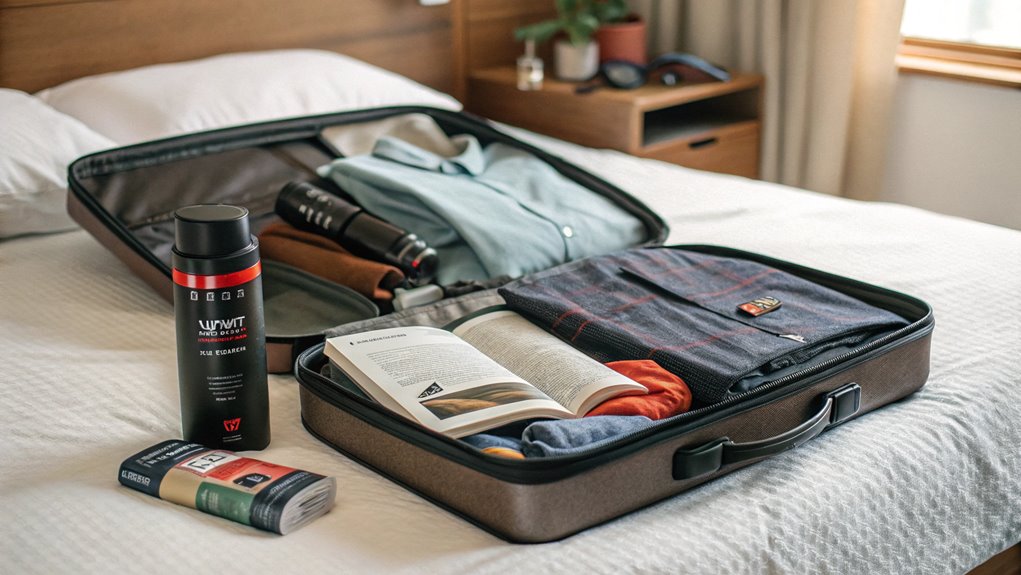
Packing for a trip can feel overwhelming, but with a little organization, you can streamline the process. First, think about your travel safety and personal security. Start by making a list of essentials, like your ID, tickets, and any medications you need.
Don't forget to check the airline's rules about what you can and can't bring on the plane, especially regarding items like pepper spray.
Next, pack your bag smartly. Use packing cubes to keep your clothes organized, and store your personal security items in an easily accessible part of your bag. If you're bringing any self-defense tools, make certain they comply with airline regulations.
It's vital to keep your valuables close, so consider using a crossbody bag or a money belt.
Lastly, always have a small first-aid kit on hand, just in case. You never know what could happen while traveling, and being prepared can help you feel more secure.
Resources for Further Information
Knowing the rules about bringing items like pepper spray on a plane is essential for your travel safety. You wouldn't want to get caught off guard at the security checkpoint, right?
To help you stay informed, there are several resources available that can guide you. First, check the Transportation Security Administration (TSA) website; they've detailed info about what you can and can't bring on board. It's a reliable legal resource that updates frequently, so you'll always have the latest rules.
Another great source is your airline's official website. Airlines sometimes have their own specific rules about items like pepper spray, and you'll want to know those before packing.
Plus, local laws vary, so looking up your state's regulations can be super helpful, especially if you're traveling from one state to another.
Don't hesitate to ask security personnel if you're ever unsure. They're there to help, and they can clarify any questions you might have.
Staying informed is key to making sure you travel safely and avoid any unnecessary headaches. So, before your next flight, take a few minutes to do your research and protect yourself!
Answers to Common Questions
Can I Bring Pepper Spray in Checked Luggage?
You can't bring pepper spray in checked luggage due to legal restrictions and safety regulations. Always check your airline's specific policies before traveling, as rules can vary and penalties may apply for violations.
What Happens if I Accidentally Pack Pepper Spray?
If you accidentally pack pepper spray, security will likely confiscate it. You might face consequences like fines or delays while they assess the situation. Always double-check your bags to avoid such issues at the airport.
Are There Specific Brands or Types of Pepper Spray Allowed?
When considering self-defense options, not all pepper spray brands are created equal. For travel safety, check specific guidelines from your airline and local regulations to guarantee you're choosing an appropriate and permissible type.
How Can I Find Out About Pepper Spray Bans in Other Countries?
Oh sure, just wing it with pepper spray in foreign lands! To stay safe, check international regulations online or consult travel forums. Researching bans can save you from unexpected, spicy encounters during your adventures.
What Should I Do if Pepper Spray Is Confiscated at Security?
If security confiscates your pepper spray, ask about the confiscation procedures and your traveler rights. Document the incident and consider filing a complaint if you believe the action was unjust or mishandled.
Bottom Line
So, before you pack your bags and head to the airport, remember that bringing pepper spray on a plane is like trying to sneak a lion into a pet store—it's just not gonna work! Always check TSA guidelines, your airline's rules, and the laws of your destination. Staying safe is super important, but you've gotta play by the rules. If you can't bring pepper spray, look for other self-defense options to keep yourself protected. Safe travels!




